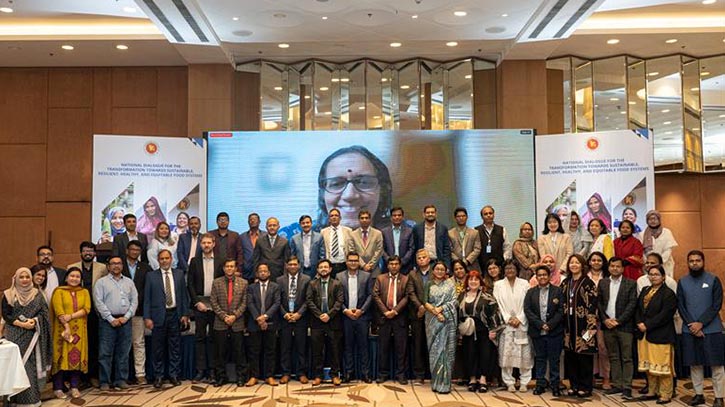
photo: Messenger
Demonstrating Bangladesh's ongoing commitment to transforming food systems, the Ministry of Food and the World Food Programme (WFP), in partnership with the International Fund for Agricultural Development (IFAD), the Food and Agriculture Organization of the United Nations (FAO), the Global Alliance for Improved Nutrition (GAIN), and other development and civil society partners, convened a National Dialogue for Food Systems Transformation in Dhaka today.
The dialogue focuses on integrating innovative, inclusive, and climate-responsive solutions into the national agenda, collaboratively shaping the National Food Systems Pathways toward more sustainable, resilient, healthy, and equitable food systems.
Participants from government agencies, development partners, academia, civil society, and the private sector spent the day immersed in discussions across five thematic action areas critical to food systems transformation:
• Nourish All People;
• Nature-Based Solutions;
• Equitable Livelihoods, Decent Work, and Empowered Communities;
• Building Resilience to Vulnerabilities, Shocks, and Stresses; and
• Means of Implementation – Governance.
“Transformation towards sustainable, resilient, healthy, and equitable food systems in Bangladesh is both a challenge and an opportunity. By focusing on nourishing all people, boosting nature-based solutions, advancing equitable livelihoods, building resilience, and accelerating effective governance, we can create a food system that is not only capable of feeding our population but doing so in a way that is environmentally, socially, and economically sustainable,” remarked Md. Monirul Islam, Additional Secretary (SDG) from the Chief Advisor’s office and Special Guest at the event.
The outcomes of the discussions will directly inform Bangladesh’s updated National Food Systems Pathways, currently being updated under the leadership of the Ministry of Food, as National Food Systems Convener, and supported by UN agencies (IFAD, FAO, WFP, WHO, UNDP, UNICEF), GAIN, CGIAR, IFPRI, among others, ensuring its alignment with the country’s Nationally Determined Contributions (NDCs) 3.0 and National Adaptation Plans (NAPs).
“We need implementation at scale of transformative solutions that gather all partners from all sectors to join efforts around a common objective of zero hunger and poverty eradication,” said Dom Scalpelli, Country Director of WFP Bangladesh.
Supported by Denmark through the UN Food Systems Coordination Hub, the event builds on Bangladesh’s leadership in advancing the global food systems agenda, demonstrated during the 2021 UN Food Systems Summit and the UNFSS+2 Stocktaking Moment in July 2023. Through these platforms, Bangladesh has reaffirmed its commitment to addressing the interconnected challenges of hunger, malnutrition, climate change, and biodiversity loss. The dialogue serves as a critical step in operationalizing the National Food Systems Pathways, by aligning national policies with sub-national and local plans while fostering multi-stakeholder collaboration.
Other guests at the event included Mr. Mahbubur Rahman, Research Director of the FPMU; Mr. Mohammad Mahbubur Rahman, Additional Secretary from the Chief Adviser’s office; Ms. Gwyn Lewis, UN Resident Coordinator in Bangladesh; Dr. Valantine Achancho, Country Director, IFAD; Dr. Rudaba Khondker, Country Director, GAIN; and Dr. Jiaoqun Shi, Representative from FAO.
For more information, please visit: The United Nations Food Systems Coordination Hub https://www.unfoodsystemshub.org/en.
Messenger/Tushar








